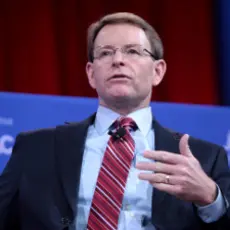Mike Huckabee’s first-place finish in the Iowa Republican caucus was a victory for the Religious Right, after the combined efforts of a number of lesser-known right-wing figures eager to nominate one of their own. But while James Dobson and Richard Land issued cautious statements endorsing the victory if not the candidate, other national religious-right activists remained aloof, maintaining that Huckabee jeopardizes the vaunted right-wing coalition by alienating some of its partners, especially allies on the economic Right.
“I'm still skeptical that Mike Huckabee is the right man to speak for them because of his views on economics and foreign policy,” said Gary Bauer. Tony Perkins of the Family Research Council said Huckabee supporters “overlooked the fact he was not attractive to other members of the conservative coalition, and they said they don't care about us, and we don't care about them."
Indeed, these prominent religious-right activists are echoing people like Patrick Toomey of the Club for Growth, who called Huckabee the “John Edwards of the Republican Party,” FreedomWorks' Dick Armey ("Huckabee undermines the GOP's longstanding unity between its traditional and economic wings"), or American Enterprise Institute Vice President Harry Olsen. Toomey’s Club has done the most to convince Republicans of Huckabee’s alleged tax-hiking heresy, running anti-Huckabee ads heavily in Iowa since the summer.
Huckabee himself has played up this reputation as a populist, deriding the “Club for Greed” and talking about “the growing angst in the middle class.”
While many pundits seem to have accepted this presentation, it’s important to separate style from substance: When it comes to economic policy, Huckabee has arguably been running to the right of any of his major opponents.
Key to jumpstarting Huckabee’s surge in Iowa, along with conservative homeschoolers, was his early embrace of a little-known right-wing group called FairTax.org, which proposes replacing all income taxes with a 23 percent national sales tax. FairTax sent at least 20 buses full of people to the Ames straw poll in August, where Huckabee finished a surprising second-place, and the group almost went broke in the fall working the campaign.
Huckabee sells the plan with a populist flair, promising to abolish the IRS and put in place a “progressive” system that would be less for everybody while rewarding “hard work and thrift.” However, the substance doesn't quite match the rhetoric.
Economists and observers on the right and left have mocked the FairTax plan as “politically unrealistic and mathematically impossible.” The 23 percent number, for example, seems to be an obvious ruse to disguise what is in fact a 30 percent tax. (Here’s how that works: adding a $30 tax to a $100 purchase is what anyone would call a 30 percent tax – but the “FairTax” folks say that $30 is only 23 percent of the new total cost of $130.)
Even that number is not sufficient to meet current government spending, which would also be taxed under the plan: Supporters include the tax government agencies would themselves pay when computing revenue but not when calculating spending. Other estimates put the required sales tax rate to meet current spending at above 50 percent.
But beyond the legerdemain and “fantasy” numbers put out by FairTax, the plan for a national sales tax—which would ignore corporate income and capital gains as well as wages—is most vulnerable to criticism that it hits the poor and middle class hardest. Bruce Bartlett, a conservative economist who worked in the Reagan administration, wrote that under the FairTax plan, “there would be an enormous shift in the tax burden from the wealthy to those with lower and middle incomes.” As Money magazine explained:
Let's say a hedge fund manager has a good year and earns $1 billion. If he can somehow manage to scrape by spending, say, $100 million, the other $900 million is tax free. He'll have paid about 2% of his income in taxes that year.
Such a scheme is far more regressive than the current income tax, and no other candidate has proposed anything so radical. Nevertheless, Huckabee continues to employ the FairTax plan as part of his “populist” image, which pundits and his right-wing opponents alike—not to mention religious-right leaders—have bought into.






